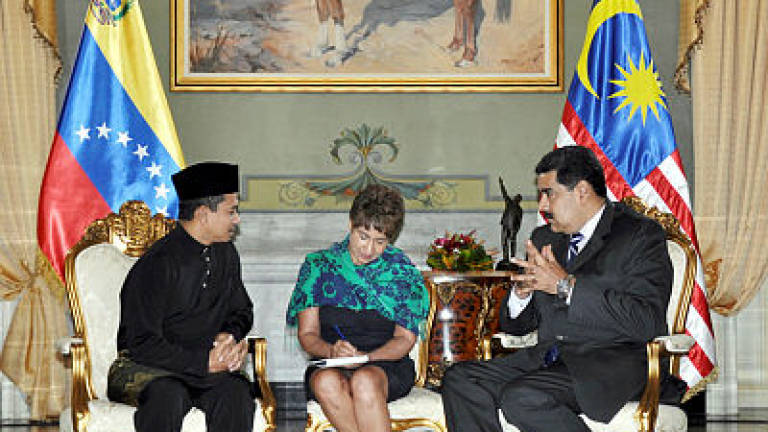Venezuela seeks support from the Islamic world amid spat with US

ASTANA: Venezuela's President Nicolas Maduro, during his participation on Sunday at an Organisation of Islamic Cooperation (OIC) summit in Astana, sought to rally the Islamic world's support for his country in its confrontation with the United States.
"The Venezuelan people, especially in the last six months, have witnessed invasions and interventions by the United States, but we will resist those pressures by maintaining our unity," Maduro said during a meeting with Iranian President Hassan Rouhani.
Maduro arrived Saturday night in the Kazakh capital to attend the Islamic summit with the aim of bringing an end to his nation's diplomatic isolation, strengthening its financial independence and avoiding the Organisation of the Petroleum Exporting Countries (Opec) nation's possible economic collapse due to a new round of US sanctions targeting Venezuelan government-issued bonds.
In addition to addressing oil, geopolitics and international cooperation with Rouhani, Maduro also met with Turkish President Recep Tayyip Erdogan and was welcomed by Kazakh President Nursultan Nazarbayev.
Upon his arrival in Astana, Maduro said that the mission of his lightning visit was to diversify economic relations with Arab countries and strengthen ties with non-members of the Opec.
In fact, on his trip to Kazakhstan, to "open gates" he made a brief stopover in Algeria, an Opec member and one of the world's largest oil and gas producers.
Maduro was invited to speak at the OIC summit, which includes 57 countries, due to his position as secretary-general of the Non-Aligned Movement (NAM), a position that he is to hold until 2019.
"It's time to fight for another world. It's time to fight for a world without wars, without terrorism, without hegemonic empires," he said, in clear reference to the United States, which he accuses of pressuring for his overthrow.
He said the OIC and the NAM could only make progress toward those objectives of justice and peace if they are united.
Venezuela deeply believes "it's time for dialogue, for a profound dialogue of cultures, civilisations and religions", the leftist president said.
The Venezuelan leader said both organisations shared principles such as "inclusive multilateralism", which he said was the "most effective tool" for addressing global challenges.
"And the rejection of the threat or use of force against the territorial integrity or the political independence of states, and the rejection of the imposition of unilateral sanctions in accordance with the provisions of the United Nations charter and the norms of international law," he added.
He also stressed their common stance in support of the "peaceful resolution of disputes, democracy, the development and respect for all human rights and basic freedoms".
With respect to the Israeli-Palestinian conflict, he said the Non-Aligned Movement, which he will head until 2019, urgently calls for a "just, lasting, comprehensive and peaceful resolution" and "condemns the illegal practices of the occupying power (Israel)".
Maduro plans to meet in Astana with representatives of member countries of Opec, but also with other producers that are not part of the cartel.
He proposed setting a price goal ahead of the next Opec summit to be held on Sept 22 in Vienna, where the cartel could extend the decision it took last December to curtail production to raise crude prices.
The president acknowledged that he planned to present in Astana a formula to stabilize oil and gas prices at sustainable levels, as those exports are crucial to the health of Venezuela's economy.
Venezuelan Oil Minister Eulogio del Pino participated in meetings Saturday in Astana with producing countries and explained that the objective is to stabilise not only oil prices but also those of gas and other energy sources.
In addition, before travelling to Kazakhstan, Maduro announced that with the aim of reducing Venezuela's dependence on the dollar and weathering US sanctions and other pressure Caracas intends to sell gas and oil in yuan, yen, rubles and rupees, among other currencies.
These measures are intended to strengthen the "socialist model" pursued over the past two decades in the Caribbean country by Maduro and his predecessor and mentor, the late Hugo Chavez.
Maduro is being accompanied on his trip by a National Constituent Assembly delegation led by the president of its international committee, Adan Chavez, Hugo Chavez's older brother.
Meanwhile, Venezuelans are voting Sunday in primaries convened by the MUD opposition coalition to choose their candidates ahead of October's gubernatorial elections